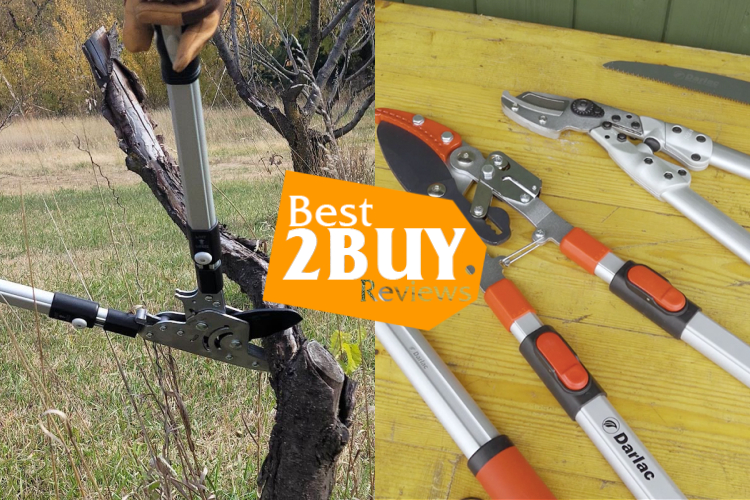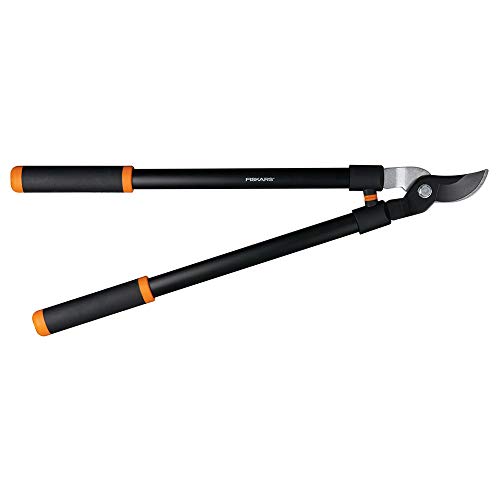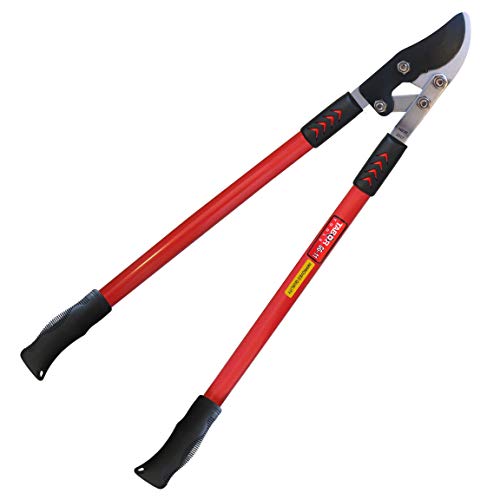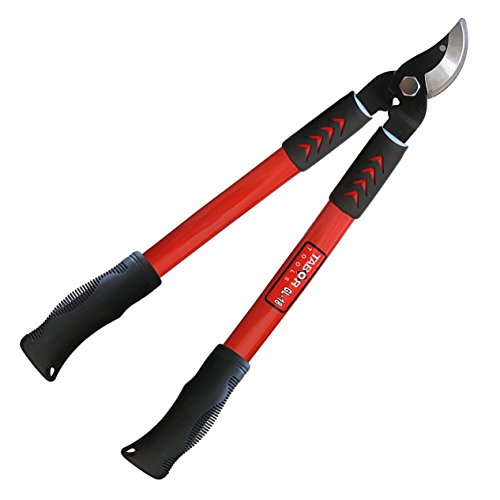Hand Loppers: A Must Have Gardening Tool

- 1. Hand Loppers: A Must Have Gardening Tool
- 2. Considerations When Buying Loppers
- 2.1. Types of Cutting Blades
- 2.2. High-Quality Steel Blades
- 2.3. Different Cutting Mechanisms for Enhanced Cutting Force
- 2.4. Handle Length Variation
- 2.5. Telescoping Handles for Extra Reach
- 2.6. Considerations for Grip Comfort
- 2.7. Importance of a Bumper
- 2.8. Availability of Replacement Blades and Parts
- 2.9. Weight Considerations
- 2.10. Balancing Cutting Capacity and Comfort
Gardening can be an enriching and satisfying pastime, yet it necessitates the use of appropriate equipment to enhance both ease and enjoyment. Among the essential tools every gardener ought to possess is a pair of hand loppers. These versatile cutting implements are specially crafted to facilitate precise and efficient pruning and trimming tasks in your garden. In the following discussion, we will delve into the concept of hand loppers, their operational mechanisms, the various types at your disposal, and elucidate why they are indispensable for any gardening enthusiast.
What Are Hand Loppers?
Hand loppers are purpose-built manual cutting implements tailored for the task of pruning and tidying up branches, stems, and twigs within your garden. These tools comprise a pair of extended handles equipped with a cutting mechanism at their tips. The cutting mechanism usually features a sharp-edged blade, crafted from robust materials like steel, along with a complementary counterblade. When the handles are compressed, the blade smoothly severs the branch or stem, delivering a precise and effective cutting action.
How Do Hand Loppers Work?
Hand loppers operate using a straightforward yet efficient lever mechanism. The extended handles offer added leverage, making it easier to trim branches. The blade and counterblade collaborate to achieve a clean and accurate cut, minimizing the risk of harming the plant. Maintaining the sharpness of the blade is vital for achieving a seamless cut, underscoring the importance of regularly maintaining and sharpening your loppers.
Types of Hand Loppers
- Bypass Loppers: The most common type of hand loppers, bypass loppers, are designed for cutting green and live branches. Functioning like a pair of scissors, the blade smoothly passes by the counterblade, resulting in a precise and clean cut. Bypass loppers are the go-to choice for delicate pruning tasks.
- Anvil Loppers: Anvil loppers feature a single blade that presses against a flat surface known as the anvil when cutting. These loppers are best suited for tackling dry and dead branches or thick and resilient stems. Anvil loppers deliver more cutting power but may slightly crush the branch compared to bypass loppers.
- Ratchet Loppers: Ratchet loppers employ a unique mechanism that amplifies your cutting effort. With each squeeze of the handles, the ratchet engages, making it easier to cut through thicker branches. They are particularly well-suited for individuals with limited hand strength, as they reduce the required force.
- Compound Action Loppers: These loppers utilize a compound lever mechanism to provide enhanced cutting power without demanding extra effort. Their versatility makes them suitable for a wide range of pruning tasks, making them a valuable tool for various gardening needs.
Why Hand Loppers Are Essential for Gardeners
- Precision Pruning: Hand loppers facilitate precise cutting, a critical factor for both plant health and aesthetics. Employing hand loppers promotes proper growth and the removal of deceased or infected branches.
- Versatility: Hand loppers prove themselves as versatile tools capable of handling a wide array of pruning tasks, including branch thinning and cutting thicker stems. Their capacity to manage various branch types renders them an indispensable addition to any gardener's toolkit.
- Effortless Cutting: The lever mechanism in hand loppers reduces the physical effort required for branch cutting, thereby making pruning and trimming less physically demanding.
- Enhanced Safety: The utilization of hand loppers guarantees cleaner cuts, diminishing the risk of tearing or harming plants, which can otherwise lead to diseases or pest infestations. Proper pruning enhances plant health and safety in the garden.
- Cost-Effective: Hand loppers come at a reasonable cost and offer long-lasting performance with minimal maintenance requirements. They represent a cost-effective investment for any gardener.
Considerations When Buying Loppers
Types of Cutting Blades
There are two fundamental categories of lopper blades: bypass loppers and anvil loppers, each suited to distinct pruning tasks. We recommend selecting the one that aligns best with your specific pruning requirements, or consider acquiring both for versatility.
- Bypass Loppers: These are the most commonly utilized loppers and consist of two blades that glide past each other, akin to scissors. They typically deliver a clean cut on live wood, promoting faster healing for the plant. However, they may become jammed when cutting dry, dead branches, potentially causing blade deformation.
- Anvil Loppers: Anvil loppers employ a single straight blade that cuts as it closes onto a flat surface or 'anvil' (similar to a knife on a cutting board). Due to the tendency of the blade to crush stems during cutting, unless it is exceptionally sharp, these are better suited for dead wood or initial pruning of live wood before making a final, precise cut with bypass loppers. Their design often allows them to handle thicker branches compared to bypass loppers.
For cutting anything thicker than 2 inches, it is advisable to use a pruning saw.
High-Quality Steel Blades
Lopper blades are typically constructed from steel, with the superior choice being blades crafted from high-quality, hardened, or carbon steel. These blades exhibit greater durability and are less prone to chipping, bending, or requiring frequent sharpening. Blades made from inferior materials tend to lose their sharpness quickly, necessitating more effort during pruning and risking damage to branches.
Some lopper blades come with a non-stick coating that resists the adhesion of sap and other sticky substances. This feature is especially beneficial when pruning trees like pine, which produce particularly adhesive sap or pitch.
Additionally, assess how closely the blades come together as you open and close them; a tighter fit is preferable. Premium loppers allow you to adjust the cutting mechanism's tightness, ensuring that the blades remain firmly pressed against each other.
Always ensure that the blades are flat, devoid of rough patches, burrs, or deformations along the cutting edge or blade surface. Lower-quality blades may exhibit slight bends, especially when used on thicker branches. Such deformations can exacerbate damage with each pruning cut and harm the branch being trimmed.
Different Cutting Mechanisms for Enhanced Cutting Force
These mechanisms are designed to amplify force, making it easier to cut through thicker branches:
- Ratcheting Loppers: When you squeeze ratcheting loppers, they lock in place, allowing you to release and squeeze again, facilitating the cut in gradual steps instead of all at once.
- Compound Action Loppers: These loppers have multiple pivot points and moving components, requiring a wider opening to accommodate the branch between the blades.
- Geared Loppers: These loppers feature a gear mechanism at the fulcrum, providing increased leverage during cutting.
It's worth noting that loppers with these mechanisms typically have more weight and additional moving parts, which can increase the risk of potential issues.
Handle Length Variation
Loppers are available with a range of handle lengths, from shorter options like 15" or 18" to longer ones measuring 32" or more. The length of the handles directly affects the leverage you have, with longer handles making it easier to cut through thicker branches. However, longer handles can also be bulkier and heavier. It's essential to choose a handle length that you can comfortably manage, as there's no point in investing in longer loppers if you can't achieve precise pruning cuts with them.
Telescoping Handles for Extra Reach
Telescoping lopper handles offer the flexibility to extend the handle length when necessary. This allows you to work with shorter, more maneuverable loppers for most tasks while still reaching higher or farther branches when required. Keep in mind that telescoping loppers are usually heavier than their non-telescoping counterparts. Additionally, pay close attention to the telescoping mechanism, as some may not securely lock in place, especially when fully extended.
Considerations for Grip Comfort
Loppers come with various handle sizes, shapes, and materials. Some are designed with ergonomic features to fit comfortably in your hand, while others use softer materials for impact cushioning. Our findings suggest that softer foam grips are the most comfortable, although they are also more susceptible to damage. Handles with contoured grips may be suitable for some users, but it's essential to try them out before purchasing, as not everyone holds loppers the same way. Additionally, check the size of the grips, as shorter ones can limit hand placement on the handles during pruning.
Importance of a Bumper
High-quality loppers are equipped with a bumper or cushioning mechanism, typically located near the blades, to prevent the handles from forcefully closing during a cut. Ensure that the bumper effectively prevents your hands from coming into contact during cutting, and test how well it absorbs shock by closing the loppers forcefully.
Availability of Replacement Blades and Parts
Not all loppers can be disassembled for cleaning or sharpening, and many lack the option to replace damaged or worn-out parts. Pay attention to loppers that have a removable bolt holding the blades together, as this often indicates a replaceable cutting blade. Generally, loppers of better quality (usually priced above $35) tend to offer replacement parts, which can be obtained directly from the manufacturer or distributor through their websites. In contrast, cheaper loppers may not provide replacement options, making it more cost-effective to replace the entire tool.
Weight Considerations
The weight of loppers is primarily determined by the material of the handles. Lighter options typically feature aluminum or fiberglass handles, while steel loppers are generally the heaviest. Wooden handles fall in between. Steel handles are commonly used for heavy-duty loppers with higher cutting capacities, but their weight can lead to discomfort during use. Aluminum handles are typically found in lighter-duty loppers, which are still robust enough for everyday tasks.
Balancing Cutting Capacity and Comfort
While some loppers can cut branches up to 2 inches in diameter, it's essential to consider the lopper's weight relative to its cutting power. Evaluate this against your own strength and physical fitness. In many cases, it's wiser to opt for lighter loppers with a smaller cutting capacity and use a pruning saw for thicker branches. Avoid attempting to cut branches that exceed your comfortable handling capacity, as straining to close the lopper handles can lead to blade or handle damage through twisting or breaking.
Hand loppers are a crucial tool for every gardener, regardless of whether you possess extensive experience or are just starting out as an enthusiast. Their adaptability, accuracy, and user-friendliness render them indispensable for preserving the vitality and aesthetics of your garden. Whether you opt for bypass, anvil, ratchet, or compound action loppers, including a pair of hand loppers in your gardening arsenal will enhance the efficiency and pleasure of your pruning and trimming duties. Therefore, ensure that you include this invaluable tool in your toolkit and witness your garden thrive with each meticulous trim.











